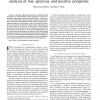Free Online Productivity Tools
i2Speak
i2Symbol
i2OCR
iTex2Img
iWeb2Print
iWeb2Shot
i2Type
iPdf2Split
iPdf2Merge
i2Bopomofo
i2Arabic
i2Style
i2Image
i2PDF
iLatex2Rtf
Sci2ools
INFOCOM
2002
IEEE
2002
IEEE
Increasing robustness of fault localization through analysis of lost, spurious, and positive symptoms
—This paper utilizes belief networks to implement fault localization in communication systems taking into account comprehensive information about the system behavior. Most previous work on this subject performs fault localization based solely on the information about malfunctioning system components (i.e., negative symptoms). In this paper, we show that positive information, i.e., the lack of any disorder in some system components, may be used to improve the accuracy of this process. The technique presented in this paper allows lost and spurious symptoms to be incorporated in the analysis. We show through simulation that in a noisy network environment the analysis of lost and spurious symptoms increases the robustness of fault localization with belief networks. We also demonstrate that belief networks yield high accuracy even for approximate probability input data and therefore are a promising model for non-deterministic fault localization.1
| Added | 15 Jul 2010 |
| Updated | 15 Jul 2010 |
| Type | Conference |
| Year | 2002 |
| Where | INFOCOM |
| Authors | Malgorzata Steinder, Adarshpal S. Sethi |
Comments (0)

